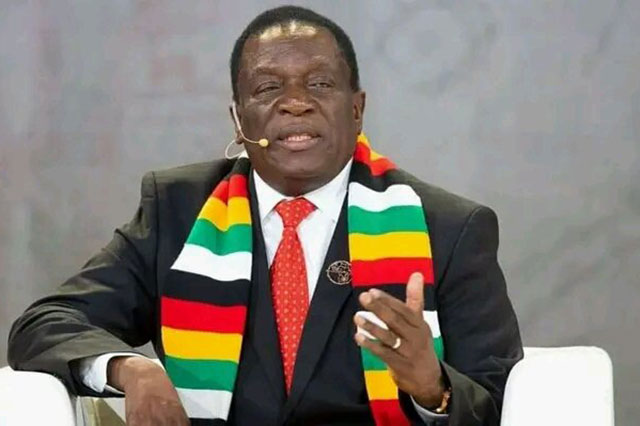Harare – Zimbabweans voted in closely-watched elections in which President Emmerson Mnangagwa is seeking a second term after a campaign tainted by a crackdown on the opposition, fears of vote rigging and public anger at the economic crisis.
President Emmerson Mnangagwa, 80, who came to power after a coup that deposed late ruler Robert Mugabe in 2017, squares off against Nelson Chamisa, 45, who leads the yellow-coloured Citizens Coalition for Change (CCC) party.
Casting his ballot in his home town of Kwekwe, central Zimbabwe, a confident Mnangagwa – nicknamed the ‘Crocodile’ for his determination – told journalists: “If I think I’m not going to take it, then I will be foolish.”
“Everyone who contests should go into the race to win”, he added, sporting his trademark multicoloured scarf.
The opposition is hoping to ride a wave of discontent over the southern African country’s economic woes that include graft, high inflation, unemployment and widespread poverty.
But delays in opening some polling stations, especially in the capital, an opposition stronghold, raised opposition concerns.
President Emmerson Mnangagwa has cast his vote at Sherwood Park Primary School in Kwekwe. #ZimElections2023 #ZimDecides2023 #ZimElection2023
📷 Ministry of Information, Publicity and Broadcasting Services pic.twitter.com/xZYWJugqp0— ZimSeen (@ZimSeen) August 23, 2023
“Funny games or no funny games our victory is certain,” Chamisa said after casting his ballot in a Harare township.
“We are going to have a new government. We are ready to form the next government”.
Voting at an elite school in Harare’s upscale Borrowdale Brooke, Michael Chitoka, a 27-year-old jobless engineering graduate, hoped to “do away with the current evil system which has made us poor”.
“I’d like an honest government, less corruption, more tolerance of other views. Not this idea of ‘you’re the enemy if you don’t agree with everything I say'”, said retired lawyer Brian Crozier, 79, as he waited to vote in the same ritzy neighbourhood which counts the country’s rich and famous among its residents.
In Harare’s oldest suburb Mbare, voters cast ballots in more than a dozen large green tents set up as polling stations on a dusty field facing rundown apartment blocks and empty wooden market stands.
“It’s important for me to vote,” said Diana Office, in her thirties. Asked if she was hopeful things would improve after the elections, she laughed.
“No,” she said. “I’m just here to exercise my right only.”
Rigging fears
Talk of change or a better tomorrow are often associated with support for Chamisa, who few would openly say they support. But the odds are stacked against the opposition.
Chamisa, a lawyer and pastor, has promised a new Zimbabwe “for everyone” and pledged to tackle corruption, relaunch the economy, and pull the country out of international isolation.
Yet, in a nation with a history of tainted elections, few believe he will emerge the outright winner.
His party has complained about being unfairly targeted by authorities, its members have been arrested, dozens of its events blocked, and little or no air time has been alloted to it on national television.
But the deputy chairerson of the Zimbabwe Electoral Commission, Rodney Kiwa, dismissed concerns about irregularities in the voters roll as “the product of creative imagination”.
Chamisa is used to disputed elections.
He narrowly lost to Mnangagwa in 2018, a poll he condemned as fraudulent. It was tainted by a deadly crackdown on post-election protests.
‘Unsustainable’ debt
In Kwekwe, unemployed voter Freddy Kondowe hoped the election would deliver him “a good job” and that “my president is going to give us good governance”.
The former British colony, then named Rhodesia, broke away from London in 1965 under white-minority rule.
After a long guerrilla war, it gained independence in 1980 and was renamed Zimbabwe.
But under Mugabe, the fledgling democracy spiralled into authoritarianism and economic decline.
The agriculturally- and mineral-rich country is burdened by “unsustainable” debt levels, according to the World Bank.
At least 6.6 million people are registered to vote.
Late deployment of voting material led to delays in polls opening in parts of the country, with just a quarter of stations opening on time in the capital Harare, according to the electoral commission.
“They are refusing to open polling stations…the regime is panicking,” Fadzayi Mahere, CCC spokeswoman, told a news conference.
To clinch re-election, Mnangagwa must win an absolute majority of votes, or he will face a run-off.
Follow African Insider on Facebook, Twitter and Instagram
Source: AFP
Picture: Twitter/@rabhahuma
For more African news, visit Africaninsider.com


